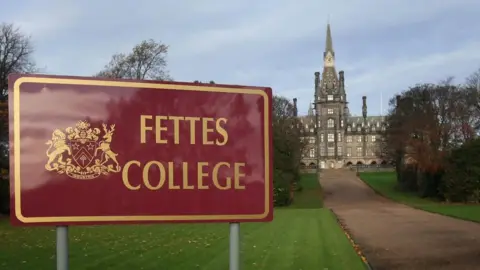Fettes teacher facing abuse claims will not be prosecuted
 PA Media
PA MediaMen who say they were abused by a teacher at one of Scotland's top private schools have been told he will not be prosecuted.
The men say they were physically and sexually abused at Fettes College in Edinburgh in the late 1970s.
The Crown Office has now told them it will not attempt to extradite their former teacher from South Africa.
In a letter to a victim it said the case was likely to have been pursued had the accused lived in Scotland.
However, they said they had to consider the delays and uncertainties caused by the process of attempting to return the man from South Africa, due to his age, the legal process there and delays caused by the coronavirus pandemic.
One of the men, who the BBC has called James, said he was told during a phone call with police that the age of the alleged perpetrator was behind the decision.
He told Radio Scotland's Drivetime with John Beattie programme: "The outcome is that given his age and given the fact that he lives in South Africa, where I gather there are restrictions applied to historical abuse, it will not be in the public interest to pursue this case and have him extradited and bring him to trial.
"It would appear to me that the unwritten principle here is that if you are of a certain age and have committed numerous sexual offences in the past you won't be answerable for your crimes in this country if you live in South Africa.
"I think it is an absolute disgrace."
'Furious at legal system'
James said he had spent the past year speaking to the Scottish Child Abuse Inquiry and police about his experiences - a process which had "unearthed all sorts of emotions from the past".
He said: "Although the police didn't promise me any kind of outcome I was led to believe there was some hope here.
"I'm gutted, devastated and really quite furious at the legal system."
A letter from the Crown Office and Procurator Fiscal Service to one man, seen by the BBC, said: "After careful consideration a decision has been taken not to prosecute."
It stated: "The extradition process is often long but in the current global pandemic, delays have become inevitable.
"In Scotland, we must be satisfied that there is sufficient evidence of the alleged crime and that it is in the public interest to prosecute. If [he] lived in Scotland, it is likely that both tests would be met in the current case.
"However, we need to consider the delay to proceedings by the process of seeking to have him returned from South Africa and the uncertainty around that."
It concluded that it was not in the public interest to prosecute "due to the significant delays incurred in seeking to extradite him during a global pandemic".
Claims taken 'seriously'
In May, a man told Drivetime he had experienced "horrendous" sexual abuse at the hands of a former Fettes College teacher in the 1970s.
The following week, two more men contacted the programme to tell their stories. All three named the same teacher.
One man claimed a teacher would "openly" fondle boys while marking their work in the classroom.
He said that on another occasion the teacher took him out of the classroom and he was "beaten up" in a changing room.
At the time Fettes said it took such claims "extremely seriously".
The school said it encouraged any alleged victims to contact Police Scotland and the Scottish Child Abuse Inquiry.
'Complex investigation'
James said his experience at Fettes had a "significant impact" on his life.
He said: "I've suffered from severe bouts of depression, turning to alcohol in my earlier days, inexplicable rages at times with my friends, family and children.
"I want anyone that was at Fettes junior school in the mid 1970s that was abused to come forward and report this to the police. Hopefully if enough come forward we can do something through public pressure to bring this man to justice."
A spokesperson for the Crown Office and Procurator Fiscal Service told the BBC: "This has been a complex investigation and COPFS appreciates that it has been a difficult time for all those involved.
"Officials from COPFS have maintained contact with the complainers over the status of the case.
"In order to protect any potential proceedings and to preserve the rights of the complainers, the Crown will not comment further at this stage."
